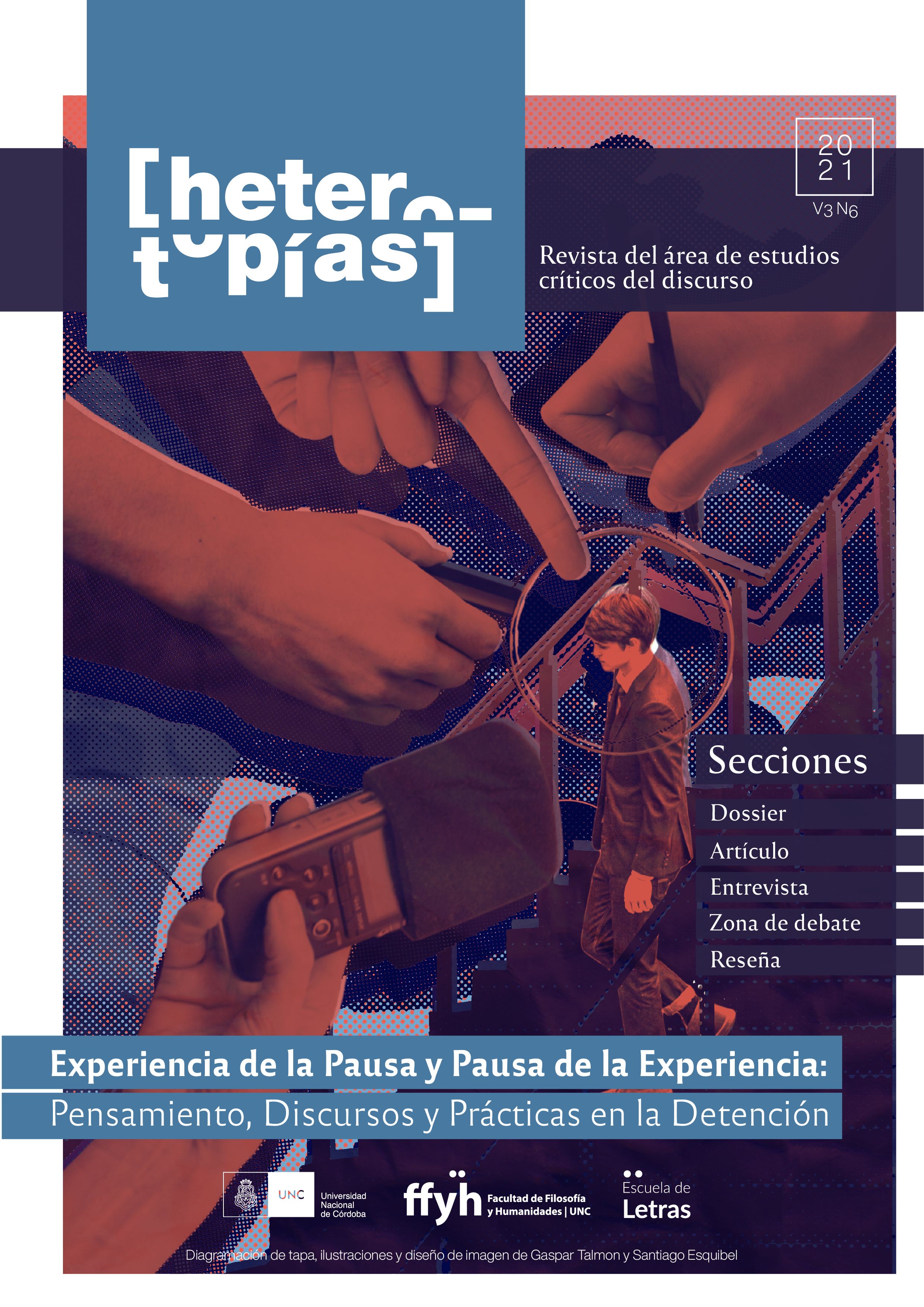Experiencie of reading(s), writing and life in the diaries of anargentine young girl of the 60s
Main Article Content
Abstract
The article explores the four diaries written by María Adela Reyna Lloveras (1947-1978) during her adolescence and before entering, almost simultaneously, the Literature career (UNC) and the organization Montoneros. The diaries, which cover since 1960 to 1966, register at the beginning the daily experiences in the domestic area –the intimate space of the room where the writing happens– and in the school area where that writing is socialized and loses its private status. But over time –and with the beginning of a love relationship that is going to be related with the later militancy– the writing becomes a register, on one hand, of the readings that Maria Adela does and, on the other hand, of her love experience and the emotions mobilised by that experience. From that moment (the start of her love life), María Adela writes and transcribes compulsively: the pages of her diaries are full of other people’s texts that she makes her own by the double practice of reading and copying (and sometimes, of stealing the signature of that she copied). Her reading and her writing are in tension: the obligations imposed by the didactic-moralizing books due to the Christian formation seek to lock up a desire that, instead, the literary texts encourage with an almost performative force, molding and modeling the affections that the loving experience imposes and that María Adela translates into another way of writing: the diary becomes an epistolar register in order to express the absence of the loved one. A question about the similarity or even the overlapping between the love experience and the one related to the militancy pretends to be, if not fully answered, at least posed in this article.
Downloads
Article Details

This work is licensed under a Creative Commons Attribution-NonCommercial-ShareAlike 4.0 International License.
Those authors who have publications with this journal, accept the following terms: Those authors who have publications with this journal, accept the following terms:
a. The authors will keep their copyright and guarantee to the journal the right of first publication of their work, which will be simultaneously subject to the Creative Commons Attribution - Non-Commercial - Share Alike (by-nc-sa) Attribution License; no commercial use of the original work or any derivative works is allowed, the distribution of which must be done with a license equal to the one that regulates the original work.
b. Authors may adopt other non-exclusive license agreements for the distribution of the published version of the work (e.g., deposit it in an institutional telematic archive or publish it in a monographic volume) provided that the initial publication in this journal is indicated.
c. Authors are allowed and recommended to disseminate their work through the Internet (e.g. in institutional telematic archives or on their website) before and during the submission process, which may lead to interesting exchanges and increase the number of citations of the published work. (See The effect of open access).
How to Cite
References
Arfuch, L. (2007).El espacio biográfico. Buenos Aires: Fondo de cultura económica.
Bossié, F. (2008). Archivos personales como soporte de memoria. Los papeles de Adelina, Madre de Plaza de Mayo. En G., Goldchluk(Coord.)Palabras de archivo. Santa Fe: Ediciones UNL y CRLA. pp. 149 – 161.
Campos, E. (2016).Cristianismo y revolución. El origen de Montoneros. Violencia, política y religión en los 60. Ciudad Autónoma de Buenos Aires: Edhasa.
Darnton, R. (1984).Los lectores le responden a Rousseau. La creación de la sensibilidad romántica. En La gran matanza de gatos y otros episodios en la historia de la cultura francesa. México, FCE. Págs.216-267.
de Olmos, C., García, N. (2017). Antes de la militancia: los diarios de María Adela Reyna Lloveras, desaparecida durante la última dictadura militar.Ponencia presentada II Jornadas/ Primer Congreso Internacional Los archivos personales: prácticas archivísticas, problemas metodológicos y usos historiográficos. Buenos Aires:Centro de Documentación e Investigación de la Cultura de Izquierdas (CeDinCi-UNSAM). Inédita.
Garayalde, N. (2019).Escenas de lectura. La lectura como interrupción. Káñina. Revista de Artes y Letras de la Universidad de Costa Rica. Vol. 4, Nro. 2. Mayo-Agosto. pp.1-18.
Iparraguirre, S. (2018).La vida invisible. Buenos Aires: Ampersand.
Lacabe, M. (2008).Importantes declaraciones de Eduardo Tucu Constanzo. EnProyecto desaparecidos: notas. Recuperado dehttp://desaparecidos.org/notas/2008/01/arg-importantes-revelaciones-d.html.
Link, D. (2017).La lectura: una vida. Buenos Aires: Ampersand.
Molloy, S. (2017).Citas de lectura. Buenos Aires:Ampersand.
Monteleone, J. (2018).El centro de la tierra. (Lectura e infancia). Buenos Aires: Ampersand.
Pauls, A. (2018).Trance. Buenos Aires: Ampersand.
Quoist, M. (1979).Dar: El diario de Ana María. Barcelona: Herder. Recuperado de: https://es.scribd.com/doc/108916942/Quoist-Michel-Dar-Diario-de-Ana-Maria.
Romano, S. (Ed.) (2016).Colectivos y parcialidades políticas y sociales. Los desaparecidos y asesinados de Córdoba en los 70. Córdoba: FFyH.
Rousseau, J.-J. (1836).La nueva Heloísa. Barcelona: Imprenta y Librería de Oliva.
Tessa, S. (3 de diciembre de 2016). Recuerdos de la madre que hizo falta.Página/12. https://www.pagina12.com.ar/6601-recuerdos-de-la-madre-que-hizo-falta.
Tessa, S. (10 de diciembre de 2009). Eduardo Costanzo, el guía del horror.Página/12.https://www.pagina12.com.ar/diario/elpais/1-136742-2009-12-10.html
